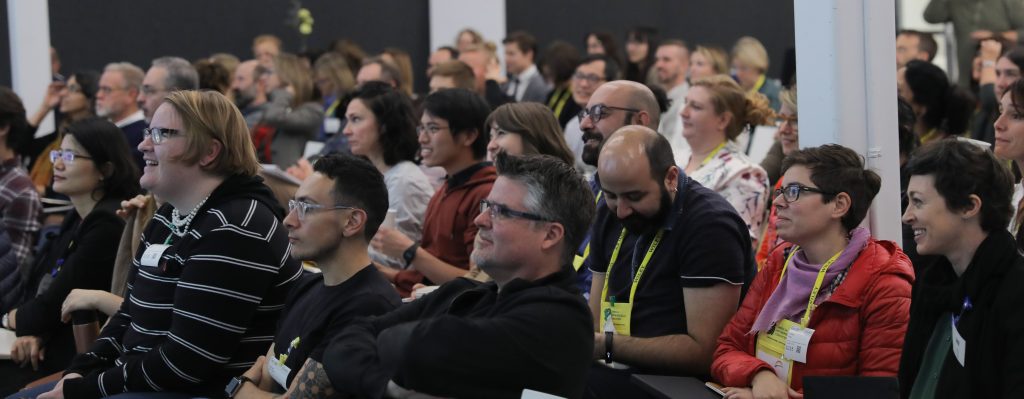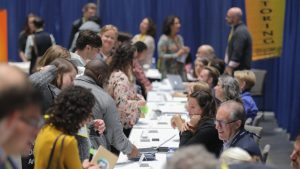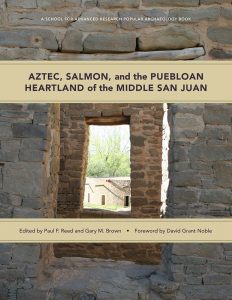SAR at AAA
Hundreds of SAR Alumni among 6,000 Anthropologists at the 2018 American Anthropological Association Annual Meeting

AAA Annual Meeting, 2018. Photo courtesy of the American Anthropological Association and Josh Gold Photography.
Earlier this month, the American Anthropological Association hosted their 117th annual meeting in San Jose, California. The events were a five-day whirlwind of presentations, panels, committee meetings, awards, and social gatherings. Among the 6,000 anthropologists and related professionals in attendance were hundreds of SAR alumni.

Alex Barker, AAA president, and Patricia Crown, recipient of the Alfred Vincent Kidder Award for Eminence in the Field of American Archaeology. AAA Annual Meeting, 2018. Photo courtesy of the American Anthropological Association and Josh Gold Photography.
Michael F. Brown, SAR president, notes about the conference, “I was especially pleased to attend events at which former SAR scholars, writers, and seminar organizers were honored for their professional achievements. Patricia Crown (UNM), editor of two SAR Press books, received the Alfred Vincent Kidder Award for Eminence in the Field of American Archaeology. David B. Edwards (Williams College), an SAR resident scholar in 1998-1999 and a recent presenter in SAR’s Creative Thought Forum, was awarded the American Ethnological Society Senior Book Prize for Caravan of Martyrs: Sacrifice and Suicide Bombing in Afghanistan (University of California Press, 2017). And Gabriela Torres (Wheaton College), who co-chaired the recent Campbell Advanced Seminar at SAR, received the AAA’s Gender Equity in Anthropology Award.”
Three other SAR staff attended this year’s meeting and took advantage of the many opportunities to reunite with alumni and connect with new scholars and artists.
For Elysia Poon, curator of education at the Indian Arts Research Center (IARC), the conference is crucial to staying up to date on professional conversations and to recruiting new interns. Poon shared SAR’s programs with those attending the one-day NAPA/AAA Career Expo intended for students and early career professionals. The expo provides inspiration for traditional and sometimes surprising employers and career avenues. Uber, she notes, was there actively recruiting anthropologists, as well as Google and other tech firms. She says, “Now, for a younger generation, and for people early in their careers, it is harder to find positions. So it is important to make ourselves available to young Native museum professionals or people working with source communities to be a resource and provide guidance.”

NAPA/AAA Career Expo. AAA Annual Meeting, 2018. Photo courtesy of the American Anthropological Association and Josh Gold Photography.
She adds, “It is helpful from the IARC perspective to get a chance to connect with potential interns, particularly people in their senior year of undergrad or who are recent graduates. It is satisfying to see people interested in what we do in terms of museum work and cultural preservation.” Poon attended other offerings at the meeting as well. “Sometimes it is hard to get a clear sense of what people are doing around the world. I went to a few sessions on indigenous practices from around the globe, and it is helpful in terms of our own pedagogy here at SAR to know what is happening in other areas and to stay connected with the most recent research and practices.”

Anthropologists Chris Nelson and David Edwards at the SAR Alumni Reception. AAA Annual Meeting, 2018. Photo by Paul Ryer.
As well as participating in the Careers Expo and other events for SAR, director of Scholar Programs Paul Ryer hosted the SAR alumni reception on Friday evening at the Tac-Oh restaurant. “It is fun to see so many alums again and to meet others for the first time. Even better is to watch these amazing scholars connect or re-connect with each other, and to learn a bit about their current writing and research.” For many of our alumni, the reunion is a special way to reconnect with scholars they see rarely. The event often spurs conversations about future research or potential new seminars – a program at SAR that brings together ten scholars for an in-depth workshopping of research at a critical stage.

Aztec, Salmon, and the Puebloan Heartland of the Middle San Juan (SAR Press, 2018).
One of the most significant ways SAR continues to inspire new scholars and inform existing researchers is through SAR Press publications. The first publications for the School were archaeological studies written by Edgar Lee Hewett and Sylvanus Griswold Morley in 1908. Since then, more than 300 titles have been published, and many have created seismic shifts in anthropological thinking. Senses of Place, edited by Steven Feld and Keith H. Basso, remains a course staple. Alfonso Ortiz’s volume, New Perspectives on the Pueblos, and Reconstructing Prehistoric Pueblo Societies, edited by William A. Longacre, transformed Southwest anthropology. Based on an advanced seminar at SAR, Writing Culture was licensed to University of California Press, where it has become a canonical text in the field.
For SAR Press acquisitions editor Sarah Soliz, the conference was an opportunity to network with both established authors and potential new contributors. Soliz, who manned the SAR Press section of the UNM Press booth, notes, “It was a genuine pleasure to spend my time in the exhibition hall talking to SAR Press authors, as well as many potential authors, whose work is changing the way we understand topics as diverse as bilingual education in Latinx communities, historical trauma in Native America, and the history of anthropology in the Southwest. I am so glad to be working with this community of scholars and activists and to be able to hear firsthand about the value of a place like SAR, which provides not only time for intensive collaboration and writing, but also publishes the books that bring these voices into society at large.”
Sometimes from Santa Fe the reach of our SAR community is not fully visible. The AAA’s annual meeting is one of the best opportunities to be reminded of our ongoing and growing connections. See you in Vancouver in 2019, AAA!
Learn more about the School for Advanced Research’s Resident Scholar Program, Seminar Programs, Internships, and Native American Artist Fellowships.
Follow SAR on social media: